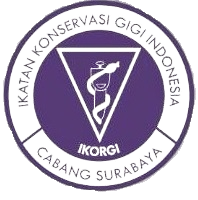Konsentrasi Efektif Ekstrak Daun Salam (Syzygium polyanthum Wight) terhadap Hambatan Biofilm Enterococcus faecalis (Effective Concentration of Bay Leaf Extract (Syzygium polyanthum Wight) to Inhibit Enterococcus faecalis Biofilm)
Downloads
Background. Enterococcus faecalis is the most dominant microorganisms found in endodontic secondary infection with prevalence ranging between 24% - 77%. Defense mechanism of Enterococcus faecalis bacteria is forming biofilm,. A study showed that bacteria in mature biofilms can 10-1000 times more resistant to antimicrobials than bacteria in a planktonic form. One of the natural substances that can be used as antibiofilm to irrigation root canals is extract of fresh bay leaf (Syzygium polyanthum Wight). Chemical components in bay leaves include flavonoids, tannins, and essential oils, which have antibacterial capability and damage the membrane biofilm. Purpose. To determine the effective concentration of fresh bay leaf extract (Syzygium polyanthum Wight) that can inhibit biofilm Enterococcus faecalis. Method. This research is in-vitro labolatory experimental with post test only control group design using microtitter plate assay. Samples using Enterococcus faecalis ATCC 29212 cultured in TSB (Trypticase Soy Broth) + glucose.Bay leaf extract (Syzygium polyanthum Wight) concentration in this study was 13%, 12.25%, 11.50%, 10.75%, 10%, 9.25%, 8.50%, 7.75%, 7%, and 6.25%. Results. At the 13% concentration of Syzygium polyanthum Wight, showed 100% inhibition of biofilm, means that the 13% concentration of bay leaf extract (Syzygium polyanthum Wight) can totally inhibit biofilm formation of Enterococcus faecalis. Conclusion. The effective concentration of bay leaf extract (Syzygium polyanthum Wight) which inhibit Enterococcus faecalis biofilm is 13%.
Stuart CH, Schwartz SA, Beeson TJ, and Owatz CB. 2006. Enterococcus faecalis: its role in root canal treatment failure and current concepts in retreatment. Journal Endododontic. Vol. 32(2). p. 93-7.
Peciuliene V, Maneliene R,Balcikonyte E, Drukteinis S, and Rutkunas V. 2008. Microorganisms in Root Canal Infections : A Review. Baltic Dental and Maxillofacial Journal. Vol. 10(1). p. 4-9.
Girard, P.L, Howard Ceri, Allan P. Gibb, Merle Olson, and Farshad Sepandj. 2010. MIC Versus MBEC to Determine the Antibiotic Sensitivity of Staphylococcus aureus in Peritoneal Dialysis Peritonitis. Journal of International Society for Peritoneal Dialysis. Vol. 30 (6). p. 652-6.
Hojo K, Nagaoka, Ohshima, and Maeda. 2009. Bacterial interactions in dental biofilm development. Journal of Dental Research. Vol.88(11). p 982-90.
Mohamed, A. J., and Huang, B.D. 2007. Biofilm formation by enterococci.Journal of Medical Microbiology. Vol. 56. p. 1581-8.
George, S., Kishen A, and Song K.P. 2011. The Role of Environmenttal Changes in Monospecies Biofilm Formation on Root Canal by Enterococcus Faecalis, Journal of Endodontics. Vol. 31 (12). p. 867-72.
Rhodes, J. S., 2006, Advanced Endodontics Clinical Retreatment and Surgery, Taylor and Francis Group, London. p. 130.
Saunders, W. 2005. Lates Concepts in Root Canal Treatment. British Dental Journal. Vol. 198 (8). p.515.
Ford, T. R. P. 2004. Harty's Endodontics in Clinical Practice. Elsevier Churchil Livingstone. p. 85-6.
Gomes, J.E., Aurelio, K.G., Costa, M.M.T., and Bernabe, P.F.E. 2008. Comparison Of The Biocompatibility of Different Root Canal Irrigants. Journal Appliance Oral Science. Vol. 16(2). p. 137-44.
Studiawan, Herra, Santosa, dan Mulja Hadi. 2005. Uji Aktivitas Penurun Kadar Glukosa Darah Ekstrak Daun Eugenia polyantha pada Mencit yang Diinduksi Aloksan. Bagian Ilmu Bahan Alam, UNAIR. Media Kedokteran Hewan. Vol. 21(2). p. 62.
Utami P, dan Puspaningtyas DE. 2013. The miracle of herbs. Jakarta: AgroMedia Pustaka. p. 61-3.
Sumono A dan Wulan A. 2008. The use of bay leaf (Eugenia polyantha Wight) in dentistry.Dental Jurnal. Vol. 41(3). p. 147-50.
Dewanti, S., and Wahyudi, M.T. 2011. Antibacteri Activity of Bay Leaf Infuse to Eschericia Coli In-Vitro. Jurnal Medical Planta. Vol. 1(4). p. 79.
Lau K.Y, Zainin N.S, Abas F and Rukayadi Y. 2014. Antibacterial and sporicidal activity of Eugenia polyantha Wight againstBacillus cereus and Bacillus subtilis. International Journal Current Microbiology Appliance Science. Vol.3(12) p. 499-510.
Rahayu, D. 2015. Aktivitas Antibakteri Ekstrak Etanol Daun Salam Segar (Syzygium polyanthum [Wight] Walp) terhadap Pertumbuhan Enterococcus faecalis. Universitas Syah Kuala.
Theilacker C, Sava I, Sanchez C.P., Bao Y., Kropec A., Grohmann E., Holst O., and Huebner J., 2011. Deletion of the glycosyltransferase bgsB of Enterococcus faecalis leads to a complete loss of glycolipids from the cell membrane and to impaired biofilm formation. Bio Medical Central Microbiology. p. 11-67.
Manner,S., Skogman, M., Goeres, D., Vuorela, P., and Fallarero, A., 2013. Systematic Exploration of Natural and Synthetic Flavonoids forthe Inhibition of Staphylococcus aureus Biofilms. International Journal of Molecular Sciences. Vol 11. p.19434-51.
Metikasari, N. I., Mudjiono, dan M., Setyobudi,. 2015. EfektivitasAntibiofilm Tanin Kulit Manggis Terhadap Bakteri Enterococcus faecalis. Conservative Dentistry Journal. Vol 5. (1). p. 43-6.
Prabuseenivasan, S., Jayakumar, M. and Ignacimuthu, S. 2006. In vitro antibacterial activity of some plant essential oils. BMC Complementary and Alternative Medicine, Vol. 6 (39). p. 1-8.

CDJ by Unair is licensed under a Creative Commons Attribution 4.0 International License.
1. The journal allows the author to hold the copyright of the article without restrictions.
2. The journal allows the author(s) to retain publishing rights without restrictions










